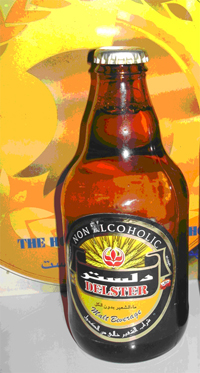Hear Nothing, See Nothing, Say Nothing
The embargo does not just apply to arms. It affects all technical goods with a dual use. A spring for an oil drill may seem innocuous enough to you. But try exporting it to Iran and you will be told that it can equally be used in a tank. There goes your export license. Through the chimney.
Now try to think of plant and machinery with a dual use, which are a standard feature in beverage production, and you will probably come up with quite a few. More than likely, these Iranian businessmen were “just looking”.
In recent years Iran has seen a formidable surge in the consumption of non-alcoholic malt beverages, if industry sources are to be believed. Quite a few established soft drinks producers have branched out into non-alcoholic malt beverages, while new entrants into the market preferred to go for more traditional ways of production. The erstwhile monopolist producer of non-alcoholic malt beverages, Behnoush, in Tehran, suddenly found its product Delster, which comes in all kinds of flavours such as lemon, peach, apple and strawberry, pursued by me-too products.
Few people outside Iran can say with some certainty they know how many companies there are which are engaged in the production of non-alcoholic malt beverages. As we all know, Iran’s powers-that-be like to keep a close eye on the segment and its performance.
Not wanting to risk a government clamp-down, Iranian businessmen with sense and even with connections prefer to remain lying low. In Iran, following the Islamic revolution in 1979, the government issued a ban on the sale and consumption of alcoholic drinks. The Iranian police strictly enforce this law and breaking it results in punishment decided by the Islamic court. At the beginning of the Islamic Revolution persons selling or consuming alcoholic drinks were punished by flagellation. These days the punishment has changed to financial penalties for the consumption and jail for the sale of alcoholic drinks.
In Iran, non-alcoholic malt beverages are the nearest-legal-thing to the forbidden brew. Otherwise they would not sport a foamy head and come packaged in bottles very much reminiscent of … ahem …
For almost three decades now, business with Iran has been highly political and politicised. The embargo is the West’s answer to President Ahmadinejad’s continued nuclear transgressions. That the embargo has been tightened in recent months should not come as a surprise given Iran’s insistence on testing a new missile with an advanced semi-solid-fuel design and a declared range of 2,000 km (1,250 miles). Guess who these missiles would be targeted at?
The Bush administration’s belligerence, right to its final days, has forced the EU to take a very close look at how its embargo against Iran is being upheld. Hence it has become more and more difficult to sell any plant and machinery to Iran whose parts could be used in Iran’s nuclear arms programmes. In effect, this has made the sale of beverage production equipment, especially heat exchangers, extremely difficult. The reason: heat exchangers can also be employed in a nuclear power plant.
Turning the spotlight on Iran-supported Hamas, the Gaza war has brought to our attention that the conflict in the Middle East has already grown beyond a purely Israeli-Palestinian dispute. This may be the reason why the new U.S. President Obama has offered direct talks with Iran, thus breaking with three decades of U.S. foreign policy.
President Ahmadinejad may be more favourably disposed towards talks than ever before. He is facing an election in June and widespread criticism as to how he has handled the economy. Even before the plunge in oil prices, from a 2008 midsummer high of USD 147 a barrel to below USD 50 in January 2009, Iranian economists had raised alarms about spendthrift policies that helped push inflation close to 30 percent.
With only perhaps USD 25 billion still in hand, out of some USD 200 billion in oil earnings over three years, the Iranian government faces stark choices. Its current budget is based on a price of USD 80 a barrel. Iran’s housing construction industry, which has absorbed hundreds of thousands of workers, could come to a halt as a result of the financial shortfall. That in turn could increase unemployment and inflation, causing popular dissatisfaction to rise.
President Ahmadinejad’s and President Obama’s envoys would have lots of issues to discuss.

